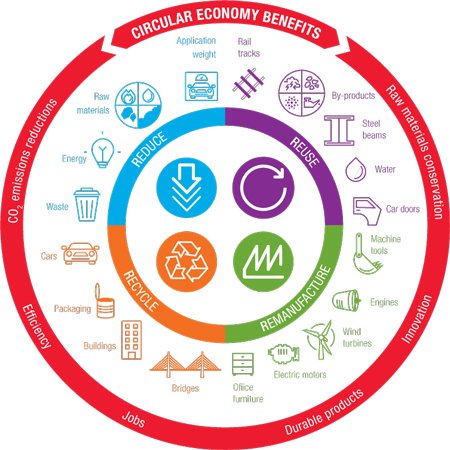In recent years, the urgency of addressing environmental challenges has catalyzed a paradigm shift in how we approach resource management and economic growth. As traditional linear economic models show their limitations in the face of mounting waste and resource scarcity, a new vision has emerged—one that embraces the principles of circularity. At the forefront of this movement are Circular Economy Platforms, innovative digital ecosystems that are revolutionizing the way businesses manage resources, minimize waste, and create value.

What is a Circular Economy Platform?
Circular Economy Platforms are digital systems that enable the transition from a linear “take-make-dispose” economy to a circular model characterized by the continuous use, reuse, and regeneration of resources. These platforms leverage technology, collaboration, and innovation to redesign the economic system, driving towards sustainability and resilience. At their core, Circular Economy Platforms seek to decouple economic growth from resource consumption, offering a pathway to prosperity within planetary boundaries.
Key Features and Functions
- Resource Tracking and Management: Circular Economy Platforms utilize technologies like blockchain, Internet of Things (IoT), and data analytics to track resources throughout their lifecycle. By providing real-time visibility into material flows, companies can optimize resource use, identify opportunities for reuse and recycling, and minimize waste.

- Material Exchange Marketplaces: These platforms host online marketplaces where businesses can buy, sell, or exchange raw materials, components, and products. By facilitating resource sharing and collaboration, these marketplaces transform waste into valuable inputs, creating new revenue streams and reducing environmental impact.

- Product-as-a-Service (PaaS) Models: Circular Economy Platforms encourage a shift towards service-based business models, where products are offered as services rather than sold outright. This incentivizes manufacturers to design products for durability, reparability, and recyclability, extending product lifecycles and reducing waste.

- Reverse Logistics Solutions: Circular Economy Platforms streamline the collection, refurbishment, and redistribution of used products and materials. By optimizing reverse logistics networks and implementing efficient refurbishment processes, these platforms enable circular supply chains and closed-loop systems.

- Consumer Engagement Tools: Many Circular Economy Platforms include tools and features to educate and engage consumers in sustainable consumption practices. From product labeling schemes to recycling guides and impact tracking apps, these tools empower consumers to make informed choices and participate in the circular economy.
Driving Innovation and Collaboration
Circular Economy Platforms serve as catalysts for innovation and collaboration across sectors. By bringing together businesses, governments, nonprofits, and academia, these platforms foster an ecosystem of shared knowledge, resources, and expertise. Collaborative partnerships enable the co-creation of solutions, the scaling of best practices, and the overcoming of barriers to circularity.
The Path Forward
As the world grapples with the interlinked challenges of climate change, resource depletion, and environmental degradation, Circular Economy Platforms offer a beacon of hope. By harnessing the power of technology, collaboration, and innovation, these platforms have the potential to transform our economy into one that is regenerative, inclusive, and sustainable.

However, realizing this vision will require collective action and commitment from all stakeholders. Governments must create enabling policy frameworks and incentives to support circular economy initiatives. Businesses must embrace circularity as a strategic imperative, redesigning products, processes, and business models accordingly. Consumers must demand transparency and sustainability from the products they purchase, driving market demand for circular solutions.
In conclusion, Circular Economy Platforms represent a transformative force in the journey towards a more sustainable and prosperous future. By reimagining our economic system and embracing the principles of circularity, we can unlock new opportunities for innovation, growth, and well-being, while safeguarding the health of our planet for future generations.




